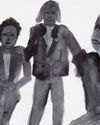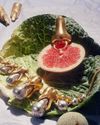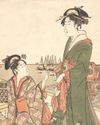In a vastly digitised world, there still remain a select few who return to fundamental crafts of the past in carving out a living for themselves.

AT A CULTURAL moment when the world is moving at a breakneck pace fuelled by the monumental advancements in technology, the idea of making a living from an old world craft seems like a novelty. Here, we profile three individuals — a potter, plant enthusiast and jeweller — who literally, craft a living by hand.
QI POTTERY
“Pottery is very related to my life. If you leave the clay unattended, it is just a pile of mud but when you put good intention and effort into it and follow through with the process, it becomes a beautiful piece of art. Just like life,” says 39-year-old potter, Kim Whye Kee as he meticulously applies glaze on a ceramic piece for firing.
Observing Kim at work is a therapeutic experience that draws in the onlooker: His fingers, dotted with tattoos, knead the clay back and forth repeatedly, working out air bubbles before setting it on a potter’s wheel parked in the corner of his work room. As the steady hum of the mechanic potter’s wheel rings in the background, Kim’s hands and eye co-ordinate in a trained rhythm, smoothing out the block of clay as it rises to take form. Around the room, teaware in various stages of finish sit lined along the wall, awaiting completion.
These four walls are the birthplace of Kim’s inventory of handmade teaware for Qi Pottery, a retail business he conceived with his now-wife, three years ago. Kim’s journey into and with pottery, like the craft itself, has been one demanding of patience, perseverance and commitment. His initial introduction to pottery is a traverse back in time to more than a decade ago.
Life back then was an entirely different regime for Kim. Recalling a troubled youth and a subsequent crime-riddled progression into adulthood, he was sentenced to prison on three separate accounts, during the last of which, a five-year sentence, Kim first took up pottery.
この記事は T Singapore: The New York Times Style Magazine の February 2019 版に掲載されています。
7 日間の Magzter GOLD 無料トライアルを開始して、何千もの厳選されたプレミアム ストーリー、9,000 以上の雑誌や新聞にアクセスしてください。
すでに購読者です ? サインイン
この記事は T Singapore: The New York Times Style Magazine の February 2019 版に掲載されています。
7 日間の Magzter GOLD 無料トライアルを開始して、何千もの厳選されたプレミアム ストーリー、9,000 以上の雑誌や新聞にアクセスしてください。
すでに購読者です? サインイン

Look At Us
As public memorials face a public reckoning, there’s still too little thought paid to how women are represented — as bodies and as selves.

Two New Jewellery Collections Find Their Inspiration In The Human Anatomy
Two new jewellery collections find their inspiration in the human anatomy.

She For She
We speak to three women in Singapore who are trying to improve the lives of women — and all other gender identities — through their work.
Over The Rainbow
How the bright colours and lively prints created by illustrator Donald Robertson brought the latest Weekend Max Mara Flutterflies capsule collection to life.

What Is Love?
The artist Hank Willis Thomas discusses his partnership with the Japanese fashion label Sacai and the idea of fashion in the context of the art world.

The Luxury Hotel For New Mums
Singapore’s first luxury confinement facility, Kai Suites, aims to provide much more than plush beds and 24-hour infant care: It wants to help mothers with their mental and emotional wellbeing as well.

Who Gets To Eat?
As recent food movements have focused on buying local or organic, a deeper and different conversation is happening among America’s food activists: one that demands not just better meals for everyone but a dismantling of the structures that have failed to nourish us all along.

Reimagining The Future Of Fashion
What do women want from their clothes and accessories, and does luxury still have a place in this post-pandemic era? The iconic designer Alber Elbaz thinks he has the answers with his new label, AZ Factory.

A Holiday At Home
Once seen as the less exciting alternative to an exotic destination holiday, the staycation takes on new importance.
All Dressed Up, Nowhere To Go
Chinese supermodel He Sui talks about the unseen pressures of being an international star, being a trailblazer for East Asian models in the fashion world, and why, at the end of the day, she is content with being known as just a regular girl from Wenzhou.